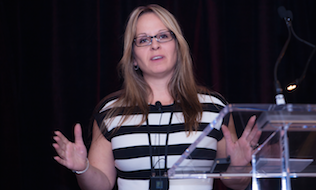
Organizations that have resilient employees are more likely to succeed in turbulent times, a University of Toronto professor told Benefits Canada’s Healthy Outcomes conference in June.
“What is it about them that’s succeeding and making them so strong?” asked Julie McCarthy, an associate professor of organizational behaviour, during a keynote speech at the June 10 event. “It’s not that stress isn’t coming at [resilient employees], but they’ll bend and bounce back.”
According to McCarthy, resilient people have higher levels of well-being and productivity and, more importantly, are successful at influencing their colleagues to be more positive. They boost group morale, team engagement and co-operation, she said.
Read: Resilience: your 21st century suit of armour
So how can companies teach employees to be resilient? McCarthy suggested companies can promote resilience by changing their culture and work practices so that employees are healthy, positive and mindful.
The key to a healthy workforce is quality sleep, a balanced diet and regular exercise, said McCarthy. Just as important is the ability to physically and mentally recover from work. “They need to detach their minds from the stress of the workplace,” she said.
To foster that work-life balance, employers can encourage employees not to work when they’re off. McCarthy also referred to research that shows people recover better from smaller periods of time off than longer breaks. As a result, people are more likely to recuperate from work successfully by taking a few days off rather than being away for two weeks, she noted.
Read: How wellness programs can empower employees with knowledge and support
As well, organizations should focus on building a positive culture that drives people to be optimistic, said McCarthy. “Positive emotions drive us forward, whereas negative emotions close us down. We are more likely to observe things and develop resources when we experience positive emotions.”
Read more coverage of the 2016 Health Outcomes conference:
- Getting a better handle on chronic disease
- A cardiologist’s prescription for better heart health
- Cheat days ‘problematic,’ says obesity expert
- The pharmacist’s role in helping plan members stay healthy
- Case study: How Campbell Canada boosted its wellness program
- Employers urged to consider millennials’ needs in designing benefits plans
Find out about more Benefits Canada‘s events
Get a PDF of the Healthy Outcomes conference coverage.
